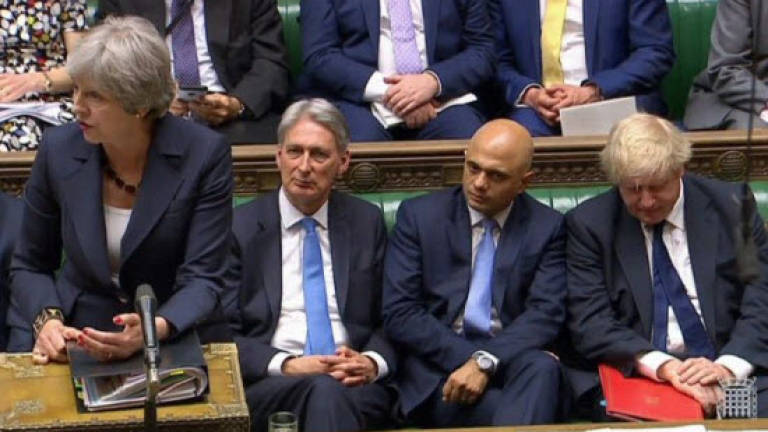'Cage fight': Lawmakers grow impatient with Brexit split

LONDON: Another day, another battle. British Prime Minister Theresa May tries once again Tuesday to unite her warring ministers on a plan for post-Brexit trade ties with the EU.
With less than 11 months to go until Britain quits the bloc, London has yet to set out a detailed plan for trade and lawmakers are becoming increasingly impatient over the lack of direction.
Stephen Crabb, a Conservative MP and former minister, expressed concern that the government was involved in "some kind of ideological cage fight" with itself.
Cabinet ministers are openly arguing about the government's two proposed options on trade, which are intended to reduce the need for customs checks, particularly on the Irish border.
After a meeting two weeks ago broke up without agreement, May divided her top ministers into two groups to work on the proposals, forcing ministers to assess the merits of each idea.
Their findings will be discussed at a ministerial Brexit meeting on Tuesday, although a final decision is not expected this week.
The unorthodox approach to policymaking highlights the difficulties May has in balancing different views within her ruling Conservative party.
The desire for Britain to forge its own path is countered by the fear of cutting economic ties.
But the failure to decide is causing consternation among lawmakers.
Former education minister Nicky Morgan warned on Monday that "parliament will have to step up to the plate".
Crabb said most Conservative MPs wanted a pragmatic compromise, and warned that if ministers did not back May, "they will find that parliament will be making the decisions for them".
Parliamentary maths
May is acutely aware of the need to get parliament onside, as both the Houses of Commons and Lords will have to sign off on any final Brexit deal agreed with Brussels.
Ahead of Tuesday's cabinet meeting, May met privately with Conservative MPs to explain to them the government's proposals.
Conservative chief whip Julian Smith, who is responsible for getting legislation through parliament, also now regularly attends ministerial meetings on Brexit.
"It comes down to the maths. The cabinet is irrelevant if she can't get the legislation through," one opposition MP told AFP.
The House of Lords recently defeated the government 14 times over its flagship EU (Withdrawal) Bill, which sets out the legal framework for Brexit.
Peers made a string of amendments on customs and single market access and the powers of parliament to amend the final Brexit deal.
MPs must now vote on each amendment, although the bill has been delayed, prompting claims that the government fears it will be defeated again.
Other Brexit legislation is backing up, with trade and customs bills stalled and others on immigration, fishing and farming still due.
'Fanatical Tory caucus'
Hardline pro-Brexit MPs have been vocal in refusing to compromise their demands for a clean break with Brussels so as to "take back control" of Britain's laws and borders.
They have criticised May's preferred customs plan, in which Britain would effectively collect tariffs on behalf of the EU — a plan Foreign Secretary Boris Johnson has blasted as "crazy".
They favour the "maximum facilitation" proposal, which would use technology to ease cross-border trade, while allowing Britain to set its own customs rules.
The eurosceptics wield significant influence in Downing Street, but when it comes to a vote in parliament commentators put their numbers at no more than 100 MPs — less than one third of the Conservative party.
Pro-Europeans from all parties meanwhile are increasingly working together, using WhatsApp to coordinate their activities.
The main opposition Labour party also changed the dynamic when it gave conditional backing to a new customs union with the EU.
Some of its members are now pressing for the party to support a Norway-style continued membership of the single market, an option backed by more than 80 Labour peers in an amendment to the EU (Withdrawal) Bill.
In an editorial, The Guardian newspaper said May should accept the need for closer economic ties as the only way to make the parliamentary arithmetic work.
"The prime minister would have to relinquish the support of the most fanatical Tory caucus, but she could make up the numbers with support from opposition MPs," it said. — AFP